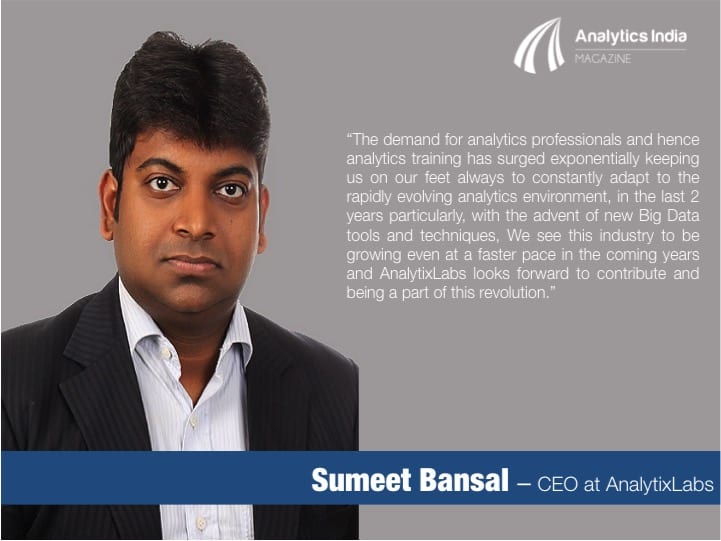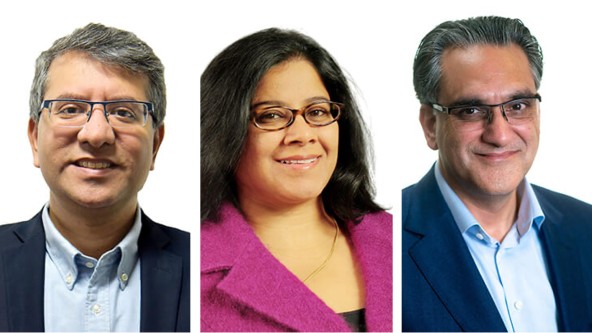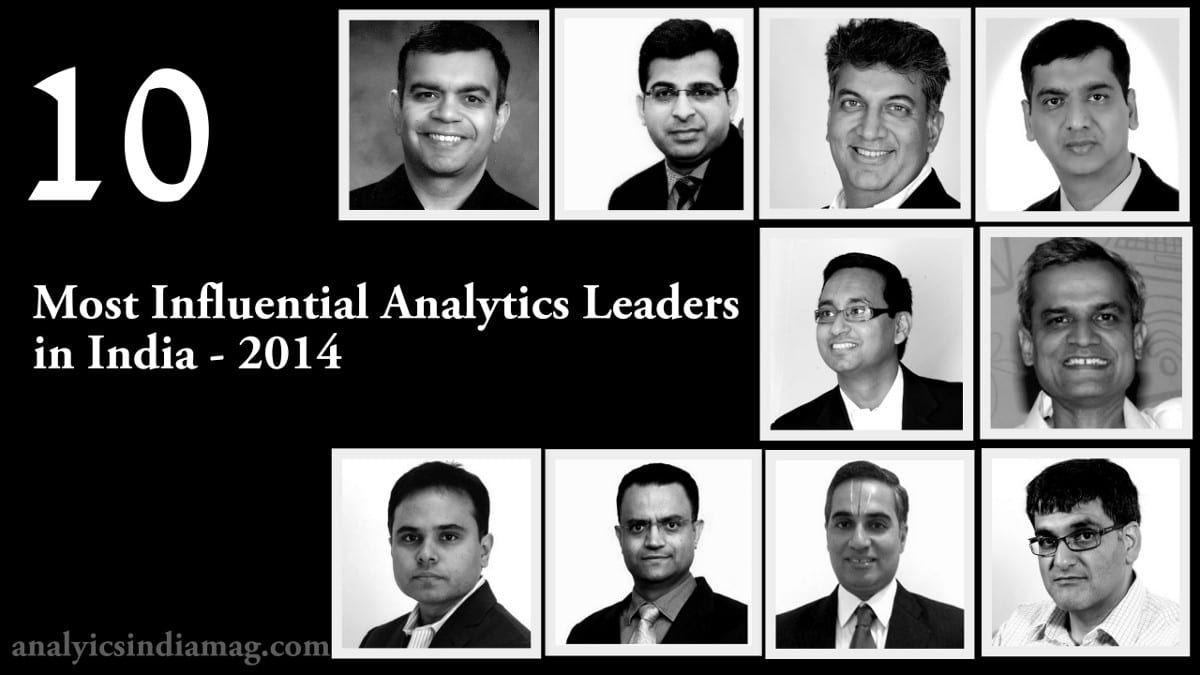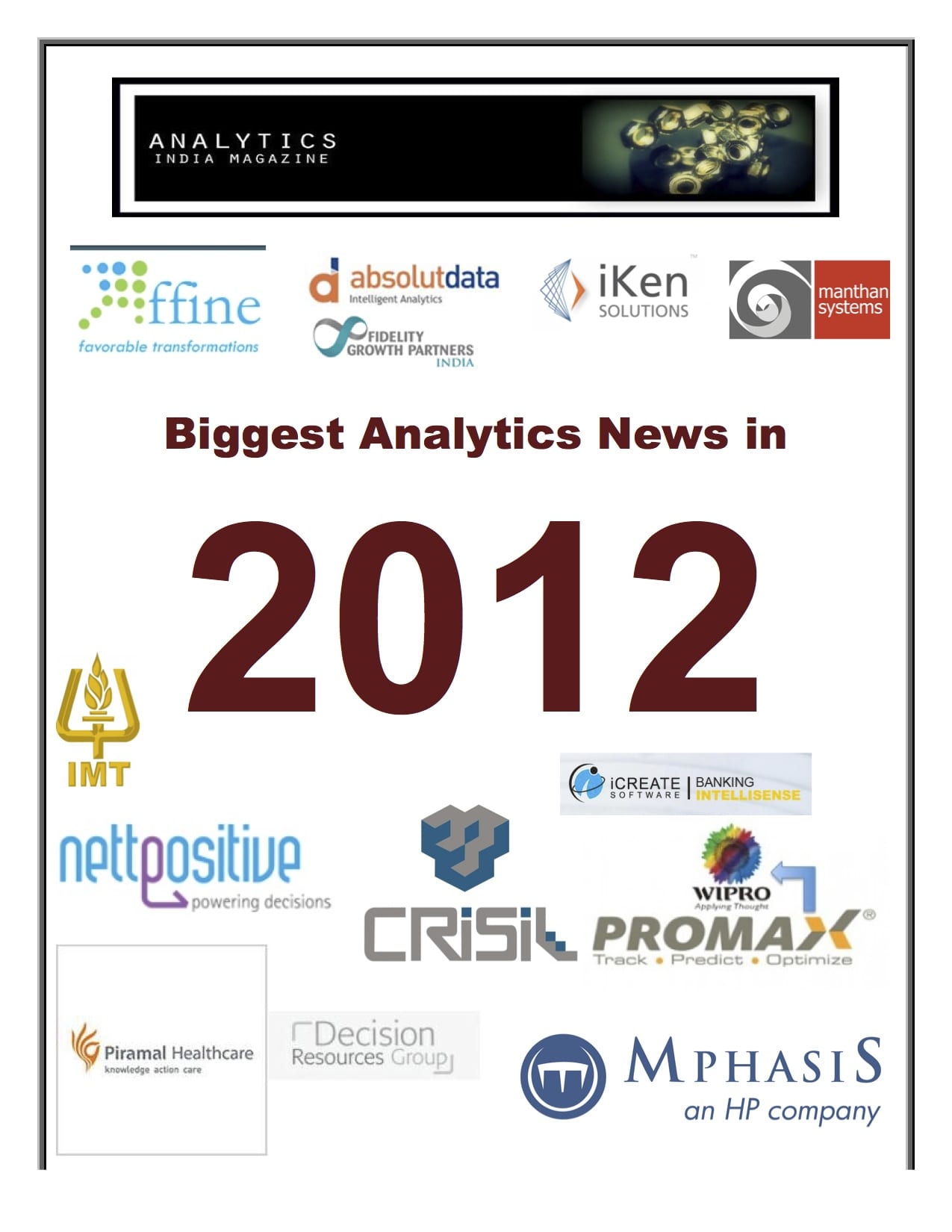Sumeet Bansal currently leads AnalytixLabs, which he co-founded in 2011. A former Business Consultant, Sumeet has worked with prestigious companies like McKinsey & Company, ZS Associates and AbsolutData in the past 8 years. He has worked in more than 10 countries spanning across Australia, Asia, Africa, Europe and USA in a multiple number of industries like High – Tech, Telecom, E- commerce, Automobiles, Pharma, etc.
He has worked extensively in domains such as Market Research, Behavioral Analytics and Customer Lifecycle Management. He has successfully helped various clients with Brand positioning, building Go-to-market strategies, Customer life-cycle management and Pricing. In his current role he is helping some leading organizations, like American Express, Jabong, Snapdeal and Indian Army on capability building. Sumeet is a motoring enthusiast, an avid reader, loves music & travel photography. He is a passionate entrepreneur involved in various tech forward ventures.
In an interview with Analytics India Magazine, Sumeet speaks about analytics education in India and how he made AnalytixLabs the leading analytics training institute in India.
[dropcap size=”2″]AIM[/dropcap]Analytics India Magazine: Can you brief us about the course curriculum and pedagogy of analytics education at your institute?
[dropcap size=”2″]SB[/dropcap]Sumeet Bansal: We have courses covering various aspects of Analytics – Data Mining and Reporting, Data Science, Big Data and Data Visualization. All courses have been crafted by the seasoned professionals and follow a structure for easy learning of the students. Our courses keep evolving given the ever-changing Analytics environment and industry requirements. Two of our most coveted programs are Data Science using SAS & R and Certified Big Data Expert. Courses now also support wider range of global certifications from SAS, Wiley, Cloudera, Hortonworks and Tableau. We also now have separate in-depth modules dedicated to advanced topics, like Machine Learning, Big Data Hadoop and one specifically curated for SAS Global certification.
As for pedagogy, ALABS follows 80:20 approach when it comes to practical vs theoretical training on various analytical concepts. This is ensured through various assignments and case studies that are provided to the students hands-on practice. The case studies and assignments provide the students exposure to wide range of business analytics problems, thereby steepening their learning curve and ensure they hit the ground running once in job.
In terms of teaching modes, there are 2 convenient options available to students: instructor- led live classes and self- paced video based training. High-degree of individual attention is given to students by giving them time post class hours in case of any doubts. Special attention is also given to students requiring help with clearing various levels of professional certifications and job interviews.
AIM: How is your institute different from other players in India providing analytics training and education?
SB: We at ALABS use a case-based approach to learning. It demands for cognitive attention i.e. stressing on analytical along with technical skills. Analytics for us, is not only about working on the tools and applying stats, but also the approach being followed and the insights being generated to drive smart business decisions. We firmly believe that analytics is an inter-disciplinary skill.
[pullquote align=”right”]Personal attention is given to all the students by the faculty to ensure adequate mentoring and guidance for the course as well as for career support. Our students have an option of repeating any part of the course for the next one year, in case they ever want a refresher. The courses are also regularly updated based upon the industry requirements.[/pullquote]Now with the popularity of analytics, it is widely recognized that almost all fields today can benefit from data usage and hence analytics. Our courses are hence aimed at teaching statistical concepts and advanced analytics techniques specific to business functions and to illustrate the inter-operability of techniques amongst various functions.
To ensure this, we have a pool of faculty with unparalleled experience. This is maintained through hand-picking of analytics practitioners from the industry who also have the patience and a flair for coaching. All our trainers have on average 8-10 years of hands-on experience in the field of analytics so that they know for themselves what will help the students in their careers upon joining analytics.
AIM: What are the major obstacles facing education on data and analytics in India?
SB: While India has come a long way on this front, there are still challenges faced by all, the primary being the lack of clarity on student’s part worsened by lack of proper guidance from most of the institutes to help them understand various roles in the analytics industry and what will be suitable based on their profile.
As a first step, we provide proper and impartial counseling to our prospective students to help them understand what will be the suitable direction for them in this industry. We also give them our advice on the likely job situation for them post the courses they will pick up so that they also understand the ROI from the course that they will do. Many a times we see people running after the buzz words like Big Data Hadoop while their profile is more conducive for the Data science programs and vice-versa. Hence, it is of utmost importance for institutes to help candidates understand the various opportunities and what will be the best option for them.
Paucity of avenues where candidates can actually learn from seasoned professionals, which is very critical considering analytics is not a technical skill but an inter-disciplinary skill. Sadly we often see analytics training being provided on SAS, Tableau and R merely as software training without any real business analytics application.
AIM: Can you let our readers know about the batch profile and the typical background of candidates that you admit?
SB: We get students with diverse work experience and domain exposure. Candidates coming to us vary from graduates to people with 15 + years of experience and belonging to industries from BPO, Education, Marketing, Telecom, Banking and Finance, IT, Healthcare etc. Having said the above, a major chunk of our candidates are mid-career professionals in the experience bracket of 4-8 years. We also have senior professionals, business leaders with more than 10-15 years of experience, and young professionals in the experience bracket of 0-3 years.
This varies a lot from course to course, for eg: the Big Data course has most people coming from IT/ Database/BI/Developer/Testing background, while the Data science program might even have fresher completing their graduation/ MBA etc.
AIM: What do you see in a candidate as someone who can shape up as a leading analytics professional?
SB: Tasks in analytics cannot end by just churning out numbers using a statistical tool. To succeed in analytics it is critical to have the ability to generate actionable business insights from the data, which can be implemented to drive business value. Your tools (Excel, SAS, R, etc) will be a backbone, the application of analytics techniques will provide the guiding direction on top of the tools, while the domain knowledge will make the analytics more actionable. Hence, these are skills that we definitely search for in an aspiring candidate.
Also, in any professional training program candidates have to be in the driving seat to extract the best value from time and money invested. A trainer can coach and mentor to a certain level, but the onus still stays with the candidate to put in effort during self-study to master the subject. Many a times we see candidates who are very regular with the live classes, but hardly put effort in self-study and needless to say this doesn’t go long way. While counselling the students we ensure that they understand this aspect and suggest them to enroll only if we will be able to take out requisite amount of time for self-study and practice.
AIM: How many students are you planning to train on analytics this year?
SB: AnalytixLabs started in early 2011 and we trained around 80 students that year. 2011 was a teaching year for us also and helped us grow in the next few years. In the year 2014, we trained over 1200 students split across various courses like SAS+ Business Analytics and Big Data, both within India and overseas. This is aside from the various corporate training and Wiley’s Train – the – Trainer program that we have been involved in through the year. We have been appreciated for our course content as well as the deep involvement of the faculty with each of the students.
2015-16 hence comes to us with higher goals, trying to more than double the numbers from 2014 that we have set and will also see new courses that we plan to add to our curriculum. While we have been moving quickly on our targeted path, lots still needs to be done. Best of luck to us!
AIM: What is your placement strategy of your students?
SB: To help candidates with the placements, we provide support at various levels – beginning from profile building, referring for various positions through our wide network of corporate contacts, HR consultants and ALABS alumni, and guiding through the interview process. The guidance during the interview process is done by our experienced faculty where they help students understand what profiles are good for them, what to expect in various interviews and also conducting mock interviews. The placement process for us doesn’t end at a definite time post the course completion, but is a long relationship that we like to build. For us placements are a win-win situation for both our corporate clients and individual students.
[quote]Given the increasing number of companies for analytics hiring, ALABS now has a dedicated placement cell to look after this. The cell is responsible for scouting for new analytics opportunities, both within and outside India, and build relationships. Suitable candidates are also offered internship opportunities within the in-house R&D wing, which is focused on upcoming advanced analytics and Big Data solutions.[/quote]
AIM: What are the most significant challenges you face in instrumenting an analytics course?
SB: In today’s world, analytics and data have gained much popularity, but not many understand exactly what it is. As a result, we continuously get calls from students who want to move to the “hot” field, but not many understand what it entails. We hence spend a lot of time in guiding students on what they should be expecting and what it means for them.
With the popularity of this field increasing, there are new trainers coming up all over. However, there is a serious shortage of trainers who are well equipped with the desired skills set, domain knowledge and relevant industry experience which is eventually required to prepare future professionals to meet the ever growing demand of skilled manpower in Analytics Industry.
Also, as I mentioned earlier, analytics professionals need to have the correct balance between the analytical tools and techniques and business knowledge. This also sometimes becomes tricky while designing courses to deliver the optimum balance between these given that we get candidates from diverse background as some candidates find it too technical while others find it less analytics heavy. To overcome this problem, we have launched different kinds of problems to suit candidates from technical to non-technical background.
AIM: What is your projection of the growth of analytics education in the future?
SB: Business Analytics and Big Data are the buzzwords of the day. All big organizations are interested in utilizing Analytics in advancing their businesses – more than 80% of the Fortune 500 companies today mention analytics as among the top 5 priorities, and more and more companies are joining this band wagon, thereby increasing the demand-supply gap. Till these jobs exist in the market, analytics education will continue to grow exponentially. And since the world has not tapped even 20% of analytics till date, there is a lot of scope for next 10 years at least.
AIM: What according to are the most important rising trends in analytics today?
SB: I think Big Data is the data the mega trend, which is paving the way for other trends, like real-time prescriptive analytics, text mining and Internet of Things.
[pullquote align=”right”]These trends are going to have a deep impact on all spheres of society like how companies operate, how the world shops, how marketers market, quality of healthcare and even the road safety.[/pullquote]In today’s world it is well-established that organizations with strong data science capabilities have decisive competitive edge. While this is just an advantage right now, which is going to become an absolute necessity as Information Technology is today for any large organizations. Secondly, organizations that are able to marry the text/ sentiment data with their transactional data are able to extract more value through actionable insights. Thirdly, Internet of things, which in fact is another side of Big Data, has potential of bringing life-transforming changes in various spheres of our society. With number of connected devices increasing 3-4 folds in next 5 years, will generate unprecedented amount of data that will even dwarf what we refer to as Big Data by today’s definition.
AIM: Anything else you wish to add?
SB: When we look back today, we have had an interesting journey since we started in 2011. From early days till now, a lot has changed – from AnalytixLabs reaching out to organizations to explain them the value of analytics to companies reaching out today proactively to build advanced analytics capabilities. The demand for analytics professionals and hence analytics training has surged exponentially keeping us on our feet always to constantly adapt to the rapidly evolving analytics environment, in the last 2 years particularly, with the advent of new Big Data tools and techniques, We see this industry to be growing even at a faster pace in the coming years and AnalytixLabs looks forward to contribute and being a part of this revolution.
Watch Sumeet Bansal’s workshop at CYPHER2015
[youtube_advanced url=”https://www.youtube.com/watch?v=jz53395yVW8″]



















































































